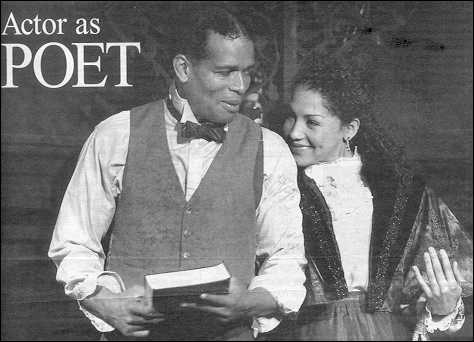22 Jun Oak and Ivy – Review, Cape Cod Times June 22, 2001
 Actor as Poet
Actor as Poet
by Amy Abern
Published: June 22, 2001
Mario Van Peebles is mercifully afflicted with Dorian Gray syndrome. Sitting across from him during a recent interview on Martha’s Vineyard and comparing that face with the one seen as Agent Stone in the 1991 release of “New Jack City,” it’s hard to believe he didn’t make some kind of deal with the devil to remain frozen in time. When this is noted, he responds with a huge smile and small murmur of thanks.

"The thing about theater is ... as an actor, it's up to you. You can't edit or revise at this stage of the game. You can't use cinematic trickology to change things around." MARIO VAN PEEBLES
Van Peebles and his gaggle of children (he declined to say how many he has) have taken up temporary residence on the island while he helps inaugurate the 20th anniversary season of the Vineyard Playhouse as the leading male in “Oak and Ivy,” a Kathleen McGhee-Anderson play chronicling the love affair between two early-20th-century poets, Paul Laurence Dunbar and Alice Ruth Moore. The play, which opened June 14, runs through July 1, also stars Rayme Cornell as Moore.
As the son of actor-director Melvin Van Peebles, the 44-year-old Van Peebles was inducted into the world of theater at age 11 portraying Nick in “A Thousand Clowns.” His film debut came in 1971 in the opening scene of his father’s feature “Sweet Sweetback’s Baad Asssss Song.” Van Peebles broke away from acting to earn a degree in economics from Columbia University and worked in the office of New York City Mayor Edward Koch in 1979 as part of the Environmental Protection Agency budget task force.
He eventually found his way back to acting and has enjoyed a successful career as a writer, producer, director and actor with such titles as “Judgment Day,” “Love Kills,” “Posse,” “Jaws the Revenge” and “Heartbreak Ridge” to his credit. Van Peebles was cast as Malcolm X in the Michael Mann movie, “The Ali Story” slated to be in theaters in November.
“This was a great project to work on, and my daughters got to be in the film as well,” says Van Peebles. He also stars in a new Showtime television network production called “10,000 Black Men Named.George,” the story of Ashley Totten, the man credited with forming the first black union, a collective of Pullman porters.
Not all of Van Peebles’ work is done on such a large scale, nor is it done with financial reward as the driving force. His work in “Oak and Ivy” has little to do with scale or money. (The theater seats only 120 people.) “You know, I’m paying the baby sitter more than I’m making doing this play,” he says.
Playing Dunbar stems from personal motivation. “When I was a kid, I loved poetry,” he says. “I still do – and I consider, myself a poet. One of the first poems I learned was Dunbar’s ‘When M’Lady, Sings.’ I saw Roscoe Lee Brown and my father perform that poem – very powerful stuff.
“This play also was the right time for me. I had wanted to get back to the theater; this project was perfect for me because of the timing and the subject matter.
“This was an interesting time in history – first-generation post slavery. I was quite impressed with Dunbar’s writing because one of the characters he wrote about was white. He took a lot of heat for that at the time, and when you think about it, it really made no sense. I mean, white people were writing about blacks, so why shouldn’t it be the other way around?”
Van Peebles notes the role of the actor on stage carries a great deal more responsibility than acting on the big screen. “Film is more of a director’s medium; TV is a producer’s medium,” he says. “The thing about theater is the directors, writers and producers have all done their work. As an actor, it’s up to you. You can’t edit or revise at this stage of the game. You can’t use cinematic trickology to change things around.”

Mario Van Peebles and Rayme Cornell rehearse a scene from "Oak and Ivy," which focuses on the love affair between poets Paul Lawrence Dunbar and Alice Ruth More.
“Oak and Ivy” fits into more than Van Peebles’ schedule – it reflects a lifestyle choice. Van Peebles describes his commitment in the past couple of years to living a life where every day counts.
“I’ve noticed there’s a fine line between doing what you want and having what you want,” he says. “And if you’re not careful, you wind up doing less of what you want to get more ‘things.'”
“I’m not a materialistic cat. My house is paid for. I have some clothes. I don’t need a lot of stuff. I spend my money on ‘doing.’ It gave me the opportunity to take my kids to China and India. It was great – the kids loved it.”





